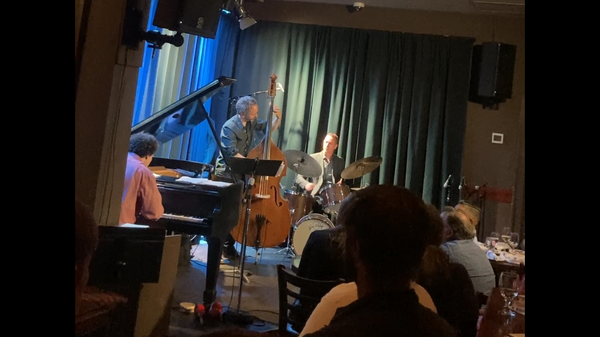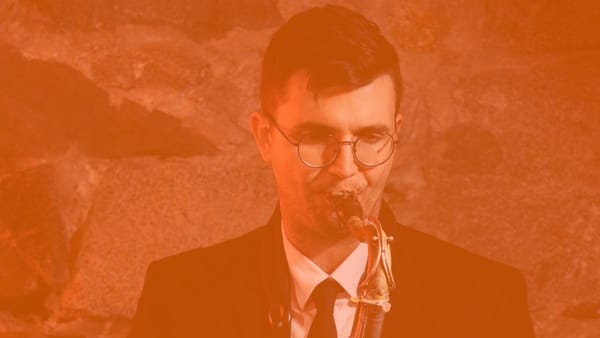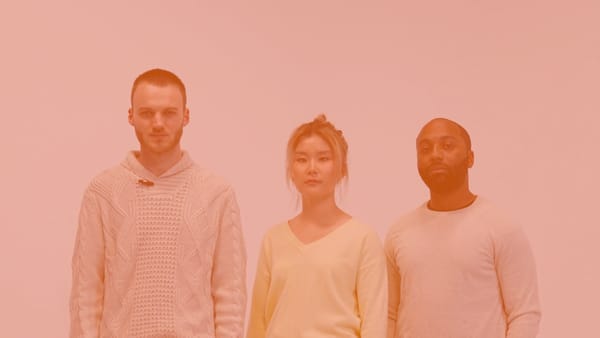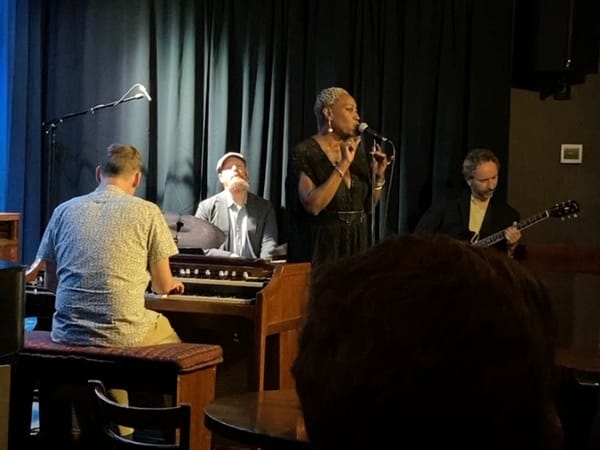Jillian Lebeck: Living in Pieces at 20
The pianist & vocalist looks back two decades on her debut and the places it’s taken her
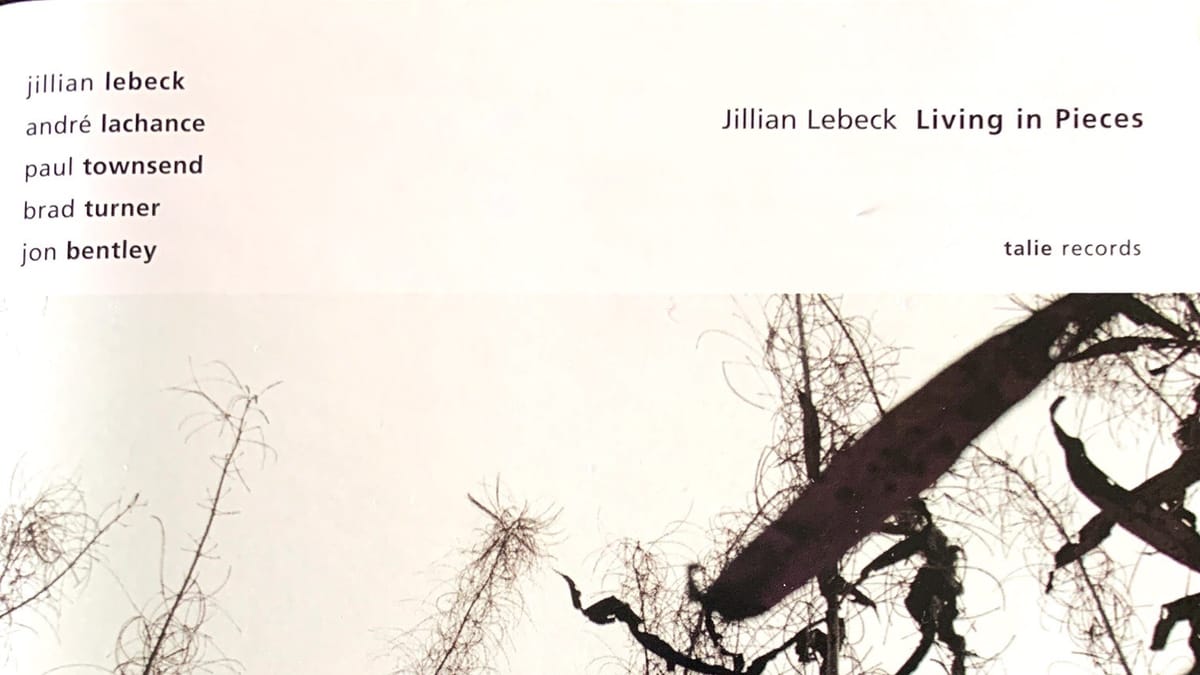
Piianist & vocalist Jillian Lebeck's first album Living in Pieces (2003) features her on piano and Rhodes in a quintet. She also sings three songs: a standard, an Ani DiFranco song, and a Rufus Wainwright song. Lebeck and I had a conversation on December 8, 2023, which has been edited lightly for clarity.
WILL CHERNOFF: I want to ask you about the more recent stuff first [...] I've got some gigs, from doing the gig list, that I've noticed you've done over the last half-year or year, including at this year's jazzfest. I know you've got one coming up in about a week as well [at La Fabrique St-George Dec. 16], but I think the first one that I wish I had caught and that I know you've done, is that you've played with one of my good friends from when I was at Cap, Kria Wall.
And I was just going to ask you, Are there other people you've been playing with recently? I want to ask you about your gigs too, but what bands have you been part of this year? We're in December. If you look back over the year, who are some of the people that you've been playing with lately?
JILLIAN LEBECK: Well, Conrad Good, he's kind of become my, first-call bass player. I hadn't played with him that much before, but now every time I get a chance, I call him and I find that we have this crazy telepathic connection with our time.
I played with Arvind [Ramdas] recently, which was fun. Gordy Li, I've been on a bunch of gigs with him and some younger players, which is cool. I have this band called Le Kors with John Korsrud, we put together a thing there with Aram Bajakian and André [Lachance], Todd Stewart and Shruti [Ramani], so that's been fun. And I've done a gig with Shruti's band over the summer, I subbed for [Noah Franche-Nolan] in Raagaverse. So that was really cool, really fun.
John Korsrud's Absolute Unit. Have you checked that out at all?
WC: Yeah, I was at one earlier this year.
JL: Yeah, that's fun. That's a really fun band. All those people [...] But yeah, Kria is great. I've also played with Thad [Bailey-Mai], he called me for a gig at 2nd Floor [Gastown], which was really fun too. And [Kria] sat in.
WC: Yeah. You did the Le Kors project. You did it in Tyrant in February, and that was maybe with Gordy and Arvind, those people you mentioned, but then you also did it at jazzfest. Not sure what the lineups exactly were, but you did that project like at least two times this year.
JL: Yeah, well the one, the one with Arvind and Gordy is a new project called Manning Park.
WC: Oh, right!
JL: It's not Le Kors. Yeah, it's a different one that I co-lead with John. But yeah, I think we did a few Le Kors things, a couple at least.
WC: Yeah. And then you also have a project called Starlight, and you did it last year too, but also this year. And this year I think you did it with Jon Bentley, with Conrad, and with Nino DiPasquale at Frankie's during jazzfest time, right?
JL: That's right. Yeah. That's my instrumental band, because before, I was doing a lot of singing, and now I have this autoimmune disease [where] I can't sing right now. It's really crazy. I don't know if it's going to get resolved or not, but it's been a while.
So now, I started a band that's different than under my name, because people were showing up expecting something else, you know? So this Starlight band, it's just originals and instrumental stuff.
WC: Yeah. May I ask how long ago that happened? I'm sorry to hear that.
JL: 2017, it started then. And then it's just gotten worse. It's really frustrating, and I feel like I can't express myself.
WC: Yeah, that timing – because I know on your own Bandcamp, you put out a solo collection of material. And it would have been probably not long after that.
JL: That's right. It wasn't long, because yeah, I sang on one track on that, which was fine. And then yeah, it happened when I was pregnant with my daughter. I don't know if that's how I got it or not, but yeah [...]
WC: And then of course, before that, you have your two full studio albums where you sang and played. Songs and Melodies, the more recent one, to me [is] maybe the more experimental one. That's up to you whether or not that's a fair characterization of that one, versus [Living in Pieces], right?
JL: Yeah, more experimental. Yeah, it was kind of like, I felt like I could, I had more of an idea of what I wanted to do in the second one. I didn't really care if people thought there were all these kind of crazy free sections, you know, but also vocal tunes. It is more experimental for sure, but also I think a little more accessible too in some ways.
WC: Maybe you could say more adventurous.
JL: Yeah.
WC: Yeah. And your your bandmates [on Living in Pieces] are all people who are still here, still active, still playing. And they have been over the whole 20 years, and you maybe still play with some of them. Or don't [...] But now that we've talked about some of the more recent stuff a little bit, I am curious to go back there and just learn more about how you ended up choosing those particular people to be the band on the first record [...] How did that come to be the band when you put that album together?
JL: Well, first of all, the idea to actually record an album was Brad's idea. He was like, you know, you really got to record something, I think you're ready. He put the bug in my ear, and so I hired him to do all the recording. He was really nice, like he put a lot of work into it. We recorded it at his house, so he engineered it and played on it. So it was kind of like he was the start of it.
André, I just wanted to play with him for a long time. I'd known of Andre [since] when I first checked out the jazz scene, he was like the first person I saw. I can't remember if I'd already played with this group before we recorded or not. But Jon Bentley, I went to cap with was a big fan of his playing. Paul Townsend, I'd played with for years, because he was my partner for 14 years. I'd played with him for a really long time.
WC: You were saying Brad told you that he felt like you were ready. If you just think about yourself at that time, did you feel like you were ready?
JL: Yeah, I guess I did, but it felt like a daunting task. It felt like I made a lot of demos already, but that's what we did back then, we made a demo. It's funny, but now it's like everybody just puts out an album so easily. But at that time, I didn't really know how to go about it. It was nice that he kind of gave me that push. And then I just started working on putting something out and kind of started my career that way.
WC: When you say, you used to make demos and now people put out albums so easily, is what you're talking about that there was more of a bar that wasn't cleared as often; and that when you made it out to actually record an album, that it was more of a special thing? And that that distinction isn't so much the case anymore. Is that close to what you mean by that?
JL: Yeah, I think so. Demos, at the time, we were kind of like, "Okay, we'll do a quick, rough recording and use it to get our gigs." But now, it's so easy to have high-quality recording done in your own house or your bedroom, and then it's so easy to distribute now and put out stuff like that. It's just a lot easier right now to actually put out bonafide recordings.
WC: Yeah. I want to ask about the material on Living in Pieces, because there's three songs that are not originals. One is a standard, and two of them are basically pop covers [..] "Sally Ann", there's "Everest", and then there's the standard, which is "You've Changed". And then the rest of them are your originals, but I want to ask about those three because you picked them. Is there anything you want to share about why you picked any of those?
JL: Sure, of course. At that time, I was really into singer-songwriters like Rufus Wainwright, Ron Sexsmith, Joni, and Ani DiFranco. I loved those tunes. I was doing a lot of singing in piano gigs, like hours of solo gigs. I would have a lot of pop music in my playlist. And so I picked "Everest", the Ani DiFranco tune, because there were certain parts about the tune that I just thought were really gorgeous, and the lyric. I thought it would compliment it nicely, I thought I'd give it a try.
And then "Sally Ann" by Rufus Wainwright was a nice vehicle for the horns, like to write that horn arrangement, I just heard it and was like, oh, I love this [..] And then "You've Changed" was influenced by Joni Mitchell's Both Sides Now album, which I had been checking out a lot, where she did a bunch of jazz standards [...]
I didn't want to do too many standards [...] I thought if I was putting too many standards on there, it would just become something else, you know. So just one standard, and it was re-harmed.
I think I also recorded a few other tunes on vocals and didn't put them on the album. I had "The Folks Who Live on the Hill", a nice tune. I had "You Had Time" by Ani DiFranco. Uh-oh, I can't remember the rest now!
WC: Did you have any original songs on the docket that didn't make the cut, like that you sang and wrote?
JL: No, I didn't start writing my own vocal tunes till that next album.
WC: Okay. I was wondering about that. Yeah. Because if you look at the track list of Living in Pieces, you know, the vocal ones, they're the songs that are the non-originals.
JL: Yeah. Yes, exactly. You know, what was funny about that is that the album kind of took off right away. But then but the thing was everybody, I guess maybe in the press releases and stuff, they only really directed people to the vocal tunes. So that was what got all the radio play.
And then when I did a tour across Canada, a lot of people were not expecting the vibe of that album, right? Like, we would do the originals and stuff, and they wanted the jazz-pop vocal stuff, like all the time. That was kind of interesting because and frustrating, because we wanted to do our thing, which is most of the album, like original instrumentals. And I was held to that. You know, I did that. And I didn't want to conform to somebody else's idea.
I kind of feel like I was always fighting with that all the time, you know? But for the rest of my career, it's like, "Oh..." Because people love the vocal, right? They're like, "Oh, I love it. I want that. That's all I want." So, yeah.
WC: They weren't expecting "Missing", which is like a 10-minute improv track, where there's three people with with wide-open solos.
JL: Yeah, exactly.
WC: Yeah. But if I think about that group of people, that's probably something – like you were saying – that would have like excited you the most about the project. When you went to perform, that was a big part of what you wanted to play.
JL: Yeah, totally. So I opened a can of worms by putting those vocal tunes on, but I do, I did love singing. I don't know, it is what it is.
WC: Are you a person who swears off and says, I can't go back and listen to my own stuff, or are you a person who is able to do so?
JL: Oh, I'm able to do so! I find that I learn so much. It's very interesting to me to see what I've noticed about what's changed, what's developed. I can accept that the stuff that I did, it's back then, it's a part of a time period. So yeah, it doesn't bother me. No problems. I do like to learn that way. I find that the best way to improve is to study your own playing, your own recordings.
WC: And now you, right now during your day, you're teaching people, and I'm sure that's a part of what you want to impart to them, right?
JL: Yeah, exactly. A lot of times I ask people to record themselves, like sit down and improvise and just put it on their voice memos, and listen back. And then maybe you'll find some tunes in there, or you'll be like, well, I did that, I'm going to edit that next time in my thing, or take that part out of my playing, or things like that.
I find it so helpful.
WC: Yeah. And speaking of that, uh, I am cognizant of your time and I'm thankful for your time. Is there anything else in particular that you would want to share or you would want people to know about this album? [...] Is there anything else on your mind that we haven't talked about yet?
JL: I mean, I really love it that you, contacted me to do this about that album. And yeah, it's like it's a time period for me that was really vulnerable, and angsty and sad a little bit. I think it comes through a little bit in the writing and stuff. I was kind of estranged from my family at that time, and I just moved out on my own.
A lot of those tunes, they were also all written after September 11th – "Longing for Longing" was written like two weeks after September 11th – so they all have a vibe to them because of that [...]
I guess I'm lucky that it did well because, uh, you know, it was not like the usual commercial thing that people would put out, but it kind of got treated like a commercial album, which I was very lucky and grateful for [...] I just really appreciate it.

Living in Pieces: Longing For Longing; You've Changed; For Chris, On a Sunday; Missing; Everest; Today; Then, Now; Sally Ann; The Unexpected. (1:01:25)
Personnel: Jillian Lebeck on vocals & keyboards; Brad Turner on trumpet; Jon Bentley on saxophone; André Lachance on bass; Paul Townsend on drums.

